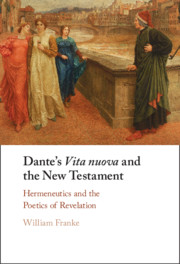Book contents
- Dante’s Vita nuova and the New Testament
- Dante’s Vita nuova and the New Testament
- Copyright page
- Contents
- Illustrations
- Prologue
- Acknowledgments
- Note on Text and Translation
- Chapter 1 Introduction: The Vita nuova as Theological Revelation through Lyrical Interpretation
- Chapter 2 The New Testament Model of Salvific Reminiscence
- Chapter 3 From Appearing and Imagining to Revealing through Interpreting: The Vita nuova’s Hermeneutics of Witness
- Chapter 4 Phenomenology versus Hermeneutics (Debate with Harrison): Revelation as Mediation
- Chapter 5 History of Effect and a New Hermeneutics-Oriented Critical Paradigm
- Chapter 6 Conclusion: The Existential Grounding of Revelation in Lyric
- Coda
- Epilogue: Dream Epistemology and Religious Revelation in Dante’s Vita nuova
- Appendix Italian Text and English Translation of the Vita nuova
- Index
Chapter 1 - Introduction: The Vita nuova as Theological Revelation through Lyrical Interpretation
Published online by Cambridge University Press: 03 September 2021
- Dante’s Vita nuova and the New Testament
- Dante’s Vita nuova and the New Testament
- Copyright page
- Contents
- Illustrations
- Prologue
- Acknowledgments
- Note on Text and Translation
- Chapter 1 Introduction: The Vita nuova as Theological Revelation through Lyrical Interpretation
- Chapter 2 The New Testament Model of Salvific Reminiscence
- Chapter 3 From Appearing and Imagining to Revealing through Interpreting: The Vita nuova’s Hermeneutics of Witness
- Chapter 4 Phenomenology versus Hermeneutics (Debate with Harrison): Revelation as Mediation
- Chapter 5 History of Effect and a New Hermeneutics-Oriented Critical Paradigm
- Chapter 6 Conclusion: The Existential Grounding of Revelation in Lyric
- Coda
- Epilogue: Dream Epistemology and Religious Revelation in Dante’s Vita nuova
- Appendix Italian Text and English Translation of the Vita nuova
- Index
Summary
Beatrice’s salutation in the streets of Florence communicates salvation in a religious and even in an eschatological register to Dante as her lover. Dante translates his experience of “beatitude” in relation to this lady into the lyrical language of his poems. He thereby endeavors, furthermore, in an evangelical mode, to communicate this experience to others who can be transformed in their own existence by means of the revelation of his witness. Beatrice is a Christ-like figure for Dante, even a mediation to him personally of Christian salvation. The lyrical quality of this experience is in excess of all objectively communicable facts and content. Hence the dynamic interplay between autobiographical prose, testifying to concrete aspects of Dante’s existence, and the poetry that manifests what these contextual facts can never encompass or exhaust. Ineffable aspects of existence are translated into the ecstatic language of lyric testifying to irreducibly personal experience. The experience of Beatrice, as interpreted in this poetry, is for Dante a transcendent revelation of divinity. The Vita nuova understands this experience in light of the Gospels and, in its turn, illuminates how the Gospels, through literary and lyrical means, become a revelation of the divinity of Jesus.
Keywords
- Type
- Chapter
- Information
- Dante's Vita Nuova and the New TestamentHermeneutics and the Poetics of Revelation, pp. 1 - 15Publisher: Cambridge University PressPrint publication year: 2021



